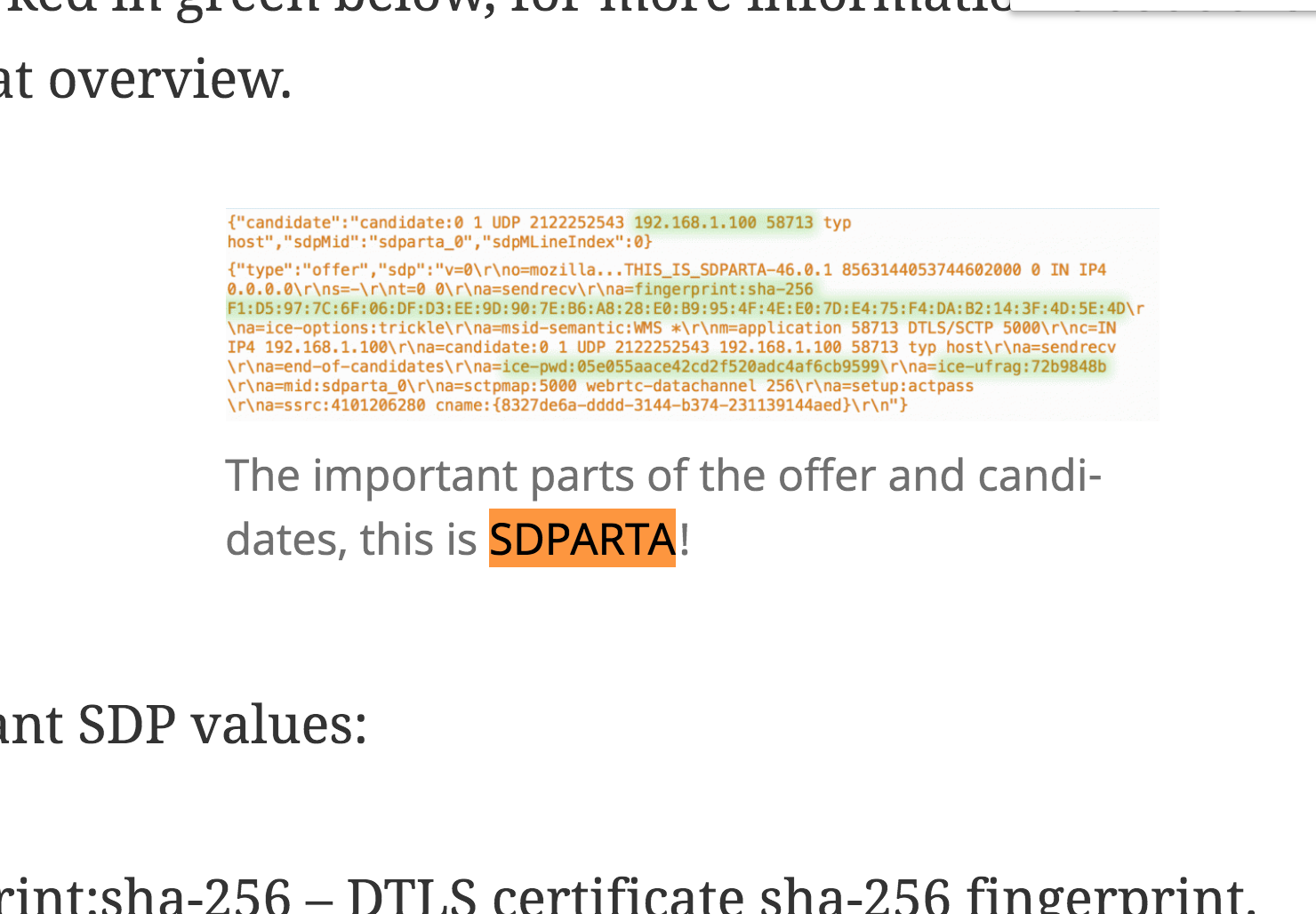When generating offer and answer objects during webRTC signaling in Firefox, Mozilla added a pun about Session Description Protocols by returning answers and offers that say "THIS_IS_SDPARTA."
Aside from being funny, does the 'arta' portion of 'SDParta' have any meaning?
Below are two SDPs. One was made in Chrome and the other in Firefox, each using the same web app, STUN server, and signaling server.
A webRTC answer object generated by Chrome:
"answer": {
"type": "answer",
"sdp": "v=0\r\no=-```numbers omitted``` 2 IN IP4 123.4.5.6\r\ns=-\r\nt=0 0\r\na=group:BUNDLE data\r\na=msid-semantic: WMS\r\nm=application 9 DTLS/SCTP 5000\r\nc=IN IP4 0.0.0.0\r\nb=AS:30\r\na=ice-ufrag:CYLs\r\na=ice-pwd:```pwd omitted```\r\na=ice-options:trickle\r\na=fingerprint:sha-256 ```sha-256 omitted```\r\na=setup:active\r\na=mid:data\r\na=sctpmap:5000 webrtc-datachannel 1024\r\n"
}
A webRTC answer object generated by Firefox:
"answer": {
"type": "answer",
"sdp": "v=0\r\no=mozilla...THIS_IS_SDPARTA-61.0.2```numbers omitted``` 0 IN IP4 0.0.0.0\r\ns=-\r\nt=0 0\r\na=fingerprint:sha-256 ```sha-256 omitted``` \r\na=group:BUNDLE sdparta_0\r\na=ice-options:trickle\r\na=msid-semantic:WMS *\r\nm=application 9 DTLS/SCTP 5000\r\nc=IN IP4 0.0.0.0\r\na=sendrecv\r\na=ice-pwd:```pwd omitted```\r\na=ice-ufrag:8e051271\r\na=mid:sdparta_0\r\na=sctpmap:5000 webrtc-datachannel 256\r\na=setup:active\r\na=max-message-size:1073741823\r\n"
}
'THIS_IS_SDPARTA' is referencing the movie 300 and the subsequent meme,  .
.
According to RFC 4566 outlining Session Description Protcol, the origin value is assigned by 'o=value' in the SDP string:
o=<username> <sess-id> <sess-version> <nettype> <addrtype> <unicast-address>
I am assuming 'THIS_IS_SDPARTA is being treated as an informal prefix to the session id according to protocol.
I can not find any use of 'ARTA' as an acronym that has any relationship to SDP or webRTC. As a word, 'Arta' could be a person's name, or a place in Greece, Djibouti, or Albania. I cannot find any correlation between ancient Sparta and Arta aside from both being Greek. Wikipedia's disambiguation page on 'Arta.'
Searching stack overflow for 'this_is_sdparta' or 'sdparta' returns code snippets of users troubleshooting their SDPs and signaling, nobody has asked a question with sdparta in their title SO search for 'sdparta', nor have any answers directly discussed 'sdparta' or 'this_is_sdparta' that I could find.
I found two examples of developers specifically talking about 'this_is_sdparta'. One is a tweet from Iñaki Baz Castillo without technical explanation:
Sense of humor in Firefox Nightly #WebRTC:
v=0 o=mozilla...THIS_IS_SDPARTA-37.0a1 44108 0 IN IP4 0.0.0.0 a=group:BUNDLE sdparta_0 sdparta_1
The other is an article, where I could not easily find the author's name and who is mostly just enjoying the humor. Here is a screenshot:

note: This is a repost of a question I deleted as it included personal network connection details. Sorry for the confusion.
Aside from being funny, does the 'arta' portion of 'SDParta' have any meaning?
